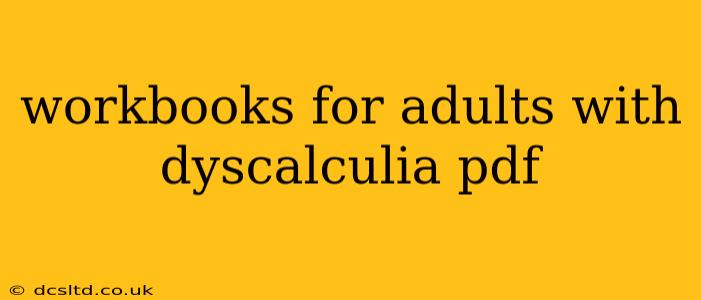Dyscalculia, a learning disability affecting mathematical abilities, can significantly impact adults in their daily lives. While there isn't a single "cure," targeted workbooks can provide invaluable support for improving number sense, calculation skills, and overall mathematical confidence. This guide explores the benefits of workbooks, identifies key features to look for, and addresses common questions surrounding their use.
What are the Benefits of Using Workbooks for Adults with Dyscalculia?
Workbooks offer a structured approach to learning and practicing math skills. They provide:
- Targeted Practice: Workbooks focus on specific areas of difficulty, allowing individuals to address their weaknesses systematically. They often break down complex concepts into smaller, manageable steps.
- Self-Paced Learning: Adults can work at their own pace, revisiting concepts as needed without the pressure of a classroom setting.
- Immediate Feedback: Many workbooks include answer keys, providing immediate feedback and reinforcing correct understanding. This is crucial for building confidence and identifying areas needing more attention.
- Increased Independence: Workbooks promote self-reliance in learning and practicing mathematical skills, reducing reliance on external support for every task.
- Improved Confidence: The gradual progression and reinforcement of concepts build confidence and encourage continued effort.
Key Features to Look for in a Dyscalculia Workbook for Adults
Not all workbooks are created equal. When choosing a workbook, look for these essential features:
- Age Appropriateness: While many workbooks are designed for children, some are specifically tailored for adults, acknowledging their unique learning needs and maturity level.
- Clear and Concise Explanations: The explanations should be easy to understand and avoid overly complex mathematical jargon. Visual aids and diagrams can greatly enhance understanding.
- Multi-Sensory Approach: Incorporating different learning styles (visual, auditory, kinesthetic) can make learning more effective. Look for workbooks that include varied activities, such as drawing, using manipulatives (if possible in a digital format), and hands-on activities.
- Gradual Progression: The difficulty level should increase gradually, building upon previously learned concepts. Avoid overwhelming learners with sudden jumps in complexity.
- Real-World Applications: Incorporating real-world examples and scenarios can make the learning more relevant and engaging. This helps learners see the practical application of their mathematical skills.
- Positive Reinforcement: Workbooks that emphasize positive reinforcement and celebrate progress can help maintain motivation and engagement.
Where Can I Find Workbooks for Adults with Dyscalculia?
Unfortunately, specifically labeled "adult dyscalculia workbooks" are less common than those for children. However, many resources can help. Search online retailers (such as Amazon) using keywords like "math workbooks for adults," "number sense workbooks," "learning disabilities workbooks," or "cognitive skills workbooks." You may also want to look for workbooks focusing on specific areas of difficulty, such as fractions, decimals, or time management. Additionally, therapeutic occupational therapists specializing in learning disabilities can often recommend specific resources.
Are there any free downloadable PDFs of workbooks for adults with dyscalculia?
While many commercial workbooks are available for purchase, finding free downloadable PDFs specifically designed for adults with dyscalculia is challenging. The availability of free, high-quality resources in this niche is limited. However, searching online for "free math worksheets for adults" or "free printable math activities" might yield some relevant results, although they may not be specifically tailored for dyscalculia. Remember to always check the source’s reliability and credibility.
What if a workbook isn't helping?
If a particular workbook isn't proving beneficial, don't be discouraged. Dyscalculia manifests differently in each individual, and what works for one person may not work for another. Consider trying different workbooks with various approaches. It's also vital to seek support from educational psychologists, therapists, or specialized tutors experienced in working with dyscalculia. They can provide personalized strategies and adapt the learning process to your specific needs. Remember, progress takes time and patience; celebrate small wins along the way.
This guide provides a starting point for finding suitable workbooks. Remember, finding the right resources and support is a crucial step in managing dyscalculia and improving mathematical skills. Consider consulting with professionals for personalized recommendations and strategies.
